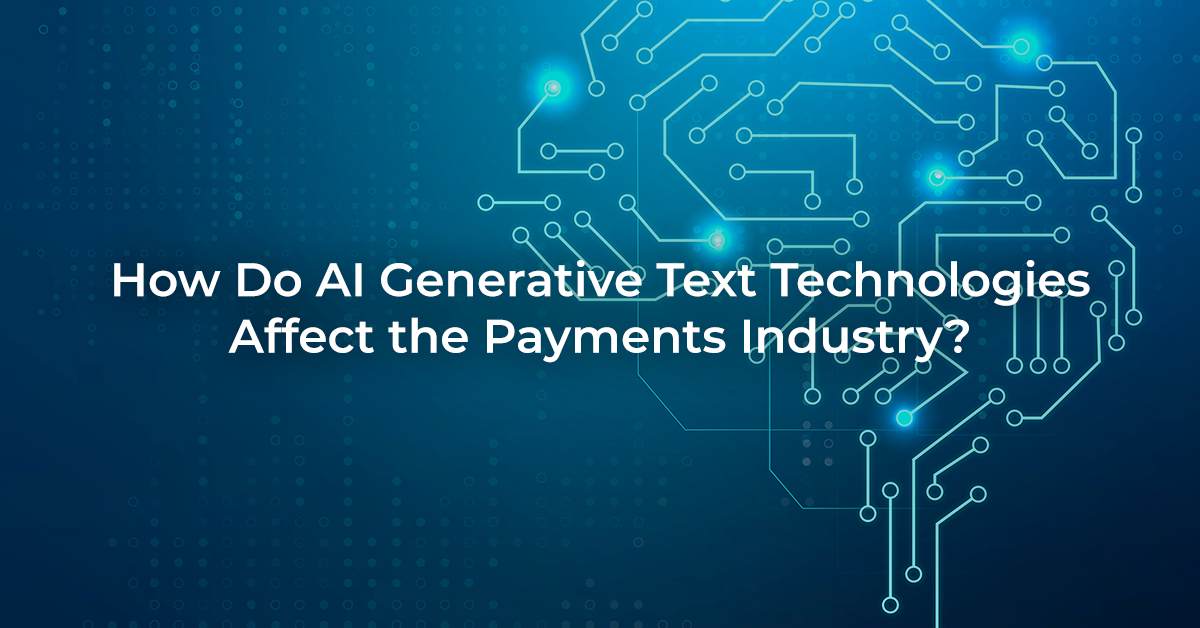
How Do AI Generative Text Technologies Affect the Payments Industry?
The payment industry has been successfully implementing the technological developments into its payment solution systems, benefitting from the advantages of pace, security and efficiency of those enhancements. The AI generative text technologies are one of the fastest growing and spreading technologies that are adopted by many industries at the same time reaching over a 100 million users two months after its launch in January 2023. The payments industry is also pretty excited about the new AI technology as it can improve the overall payment system functioning by improving and smoothing the user experience up to a great extent. Therefore, the intersection of artificial intelligence (AI) and the payment industry is expected to create a paradigm shift in the payment landscape, especially in the e-commerce field. However, there are still concerns related to specific aspects of the AI generative text technologies that are related to safety, infrastructure security and data accuracy.
Innovation at The Payment Industry
The payment industry has been continually evolving, driven by the advent of technology. The introduction of artificial intelligence (AI) and machine learning (ML) to this sector has accelerated this evolution as they provided expedited transactions, enhanced security, and augmented user experience. AI has become a vital instrument in the payments landscape in predicting fraudulent activities, reducing false positives, making risk assessments more accurate and minimizing the overall operational costs. Additionally, the ability to analyze vast amounts of data in real-time enables businesses to make informed, data-driven decisions while boosting operational efficiency. AI adoption also boosted the quality of customer experience by offering a more personalized payment service. By understanding consumer behavior patterns, AI can recommend tailored financial products and services, thus enhancing customer satisfaction and loyalty.
The new AI generative text technologies are predominantly used to create chatbots that can answer customer questions about payments, process payments, and even offer personalized recommendations. AI can also be used to create new forms of payment, such as voice payments and contactless payments.
What Is ChatGPT and How Does It Relate to Payments?
ChatGPT, being one of the most popular AI generative text technologies, is a generative language model developed by OpenAI that can be used to create chatbots which carry the ability to have conversations with humans. It is possible to create various chatbots via ChatGPT to be used in different industries including the payment industry. Rooted in machine learning, ChatGPT is capable of understanding and generating human-like text, making it a potent tool in customer service. A chatbot created to be used in the payments industry can answer customer questions about transactions, automate payment reminders, simplify transaction-related inquiries, provide instant support round the clock and even offer personalized recommendations. Giving financial advice, supporting customers in understanding perplexing financial terms, budget planning and making investment decisions are among the features of a ChatGPT chatbot used in the payments industry. For the financial institutions and businesses, ChatGPT helps improve the overall efficiency and productivity as it creates space for contemplation on strategic operations.
Is It Possible to Integrate Payments into Generative AI?
Ideally, it is possible to integrate payments into generative AI chat platforms; however, in practice, the technology is still in its infancy phase and needs further improvement. Issues of user data safety, information accuracy, and infrastructure security need to be addressed in detail and solved before achieving a full integration of AI generative text technologies into payments. As AI technologies continue to mature, we can expect to see AI models conducting financial transactions directly in the future which can enhance the overall efficacy of the payments systems.
In a scenario where ChatGPT is acting as a virtual assistant and can process payments on behalf of the user, based on predefined rules and consent, it is possible to create a smoother streamline for the payment process. It can be used to create voice payments and contactless payments, which allow users to pay for goods and services without having to fumble with their wallets or purses. It could also enhance the security of transactions, as AI models can effectively detect anomalies and prevent fraudulent transactions. Nevertheless, before this full integration, the challenges of user data privacy, security, and regulatory compliance need careful consideration. Ensuring transparency and ethical use of AI will be paramount in building users’ trust in such systems.
In conclusion, AI generative text technologies, exemplified by models like ChatGPT, have a major impact and promise a tremendous potential in the payment industry. As we stand on the edge of this technological revolution, what is critical is to navigate this journey responsibly, ensuring the benefits of AI are harnessed without compromising on ethical standards and user security. If used properly, these technologies have the power to change the way the payment system operates in a positive way by making payments more personalized, secure, and convenient. As AI technology continuously evolves and develops, it is likely that we will see even more innovative payment solutions emerge and the benefits from these technologies will increase in the future.
Murat Kurtulmuş, Implementation and Support Director

